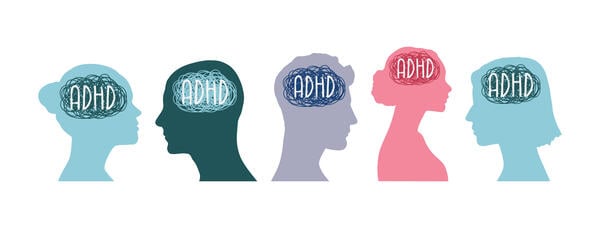
How to Create an ADHD Academic Community (opinion)
“Have you ever considered you might have ADHD?” My therapist asked me that during my second year of Ph.D. studies at Cornell University. I had just mentioned my 8-year-old nephew’s diagnosis, adding that both my brother and father had it too. She explained how attention deficit hyperactivity disorder manifests differently in women—less hyperactivity, more internal struggle—and why men and children with more recognizable symptoms are diagnosed earlier.
The diagnosis, when it finally came, illuminated a lifetime of confusion: why simple tasks felt insurmountable, why my brilliance arrived in unpredictable bursts, why I could hyperfocus for 12 hours on coding but couldn’t remember to pay rent. Then the pandemic hit. Isolated in my apartment, stripped of external structure, I watched my symptoms spiral out of control. My dissertation research stalled. My carefully constructed coping mechanisms crumbled. I wasn’t just struggling with ADHD—I was drowning in it.
I had been thinking about creating a space specifically for academics with ADHD. In a therapy group, I met another graduate student silently battling the same demons. When I shared my idea, she immediately understood its value. Together, we organized our first meeting, gathering a few friends via Zoom. Our numbers grew after I took a calculated risk during a department seminar—openly discussing my diagnosis and the unique challenges it created in academic life. Private messages trickled in from students across departments, each one a confession of silent, similar struggles.
My courage to speak openly came from an unexpected source. Months earlier, a successful visiting professor had casually mentioned getting diagnosed with ADHD after their first year on the faculty. Seeing someone in a position I aspired to reach discuss their diagnosis so matter-of-factly gave me hope. This cascade effect—from the professor to me, from me to others—became how our community grew.
Four years later, our weekly meetings continue, even as many of us have graduated and moved to new institutions. What began as a survival mechanism during isolation has evolved into a sustainable community that transcends institutional boundaries.
The Challenges of Being an Academic With ADHD
Academia presents unique challenges for individuals with ADHD that differ from those found in other professional environments. Research requires sustained focus over months or years with minimal external structure—a particularly difficult task for the ADHD brain that thrives on novelty and immediate feedback. Grant deadlines, publication timelines and research planning demand executive functioning skills that many of us struggle with, despite high intelligence and creativity.
But ADHD’s effects on academic life extend far beyond issues of executive function. Rejection sensitive dysphoria—the intense emotional response to perceived criticism—can make grant rejections and peer review feedback devastating rather than constructive. What neurotypical colleagues might process as routine academic critique can trigger profound emotional responses that interrupt work for days or weeks.
Time blindness affects how we manage projects and deadlines in significant ways. The inability to accurately perceive how much time has passed or how long tasks will take creates a pattern of either last-minute panic work or paralysis when deadlines feel abstractly distant. Poor working memory impacts our ability to hold multiple concepts in mind during writing and research, often leading to fragmented work processes that others misinterpret as lack of focus or commitment.
Many of us also struggle with auditory processing issues that make departmental meetings, lectures and conferences particularly taxing. The cognitive effort required simply to process spoken information in these settings depletes mental energy.
Traditional academic support resources rarely address these specific challenges. Time management workshops typically assume neurotypical brain functioning and don’t account for the variable attention and motivation that characterizes ADHD. Productivity advice often focuses on willpower and discipline rather than taking into account neurodivergent traits. Even when disability services are available on campus, they tend to focus on classroom accommodations rather than the holistic challenges of academic life with ADHD, particularly the unstructured aspects of research and writing that often cause the greatest difficulty.
Building Our Community
Our initial meetings were simply virtual gatherings to validate frustrations and share strategies. The pandemic actually provided an unexpected advantage—virtual meetings allowed us to participate from our most comfortable environments, pacing or fidgeting as needed.
While we first attempted a highly structured approach with designated facilitators, we quickly discovered this created more pressure than relief. What worked better was a simple pattern: rounds of updates in which each person shares recent struggles and wins, plus spontaneous advice sharing and time spent setting intentions for what we’ll accomplish next.
Creating psychological safety was paramount. We established clear confidentiality guidelines—what’s shared in the group stays in the group. Group norms evolved organically: no shame for forgetfulness, no competitiveness with one another, and a focus on solutions rather than just venting. We emphasized how ADHD traits such as hyperfocus and creative thinking can become significant strengths when properly channeled.
Starting Your Own Group
Based on our experience, here’s how to create an effective ADHD academic community:
- Start small with trusted connections. Begin with three to five people you already know to establish psychological safety before expanding.
- Consider independence from institutional structures. Our unofficial status meant less administrative hassle and allowed continuity as members graduated.
- Implement minimal structure. Our simple meeting format provided enough structure to be productive while allowing flexibility. A rotating notetaker helped members with memory challenges revisit past discussions.
- Embrace accessible, virtual options. We created a shared calendar and Slack channel for regular meetings, but also allowed members to add impromptu co-working sessions.
- Share resources collaboratively. Regularly exchange tools and strategies—from productivity apps to therapist recommendations to successful accommodation requests.
- Prioritize confidentiality. Some members may not have disclosed their diagnosis in their departments, making the group their only space for open discussion.
Impact Beyond Expectations
Members of our group have reported significant improvements in completing dissertations, meeting deadlines and navigating the job market with ADHD. The psychological benefits have been equally profound. Academia’s competitive nature breeds imposter syndrome, amplified for those with ADHD. When peers appear to effortlessly juggle multiple responsibilities while you struggle with basic tasks, the comparison can be crushing.
In our group, however, we found role models who shared our challenges. Watching fellow ADHD academics successfully defend dissertations or secure positions created a powerful ripple effect of inspiration. These visible successes provided concrete evidence that academic milestones were achievable with ADHD, motivating others to persevere through their own struggles.
While consistent attendance can be challenging (unsurprisingly, given our shared attention difficulties), we’ve found that maintaining a no-pressure atmosphere works better than strict accountability—members drift in and out as needed, returning without shame.
Finding Connection Through Shared Neurodiversity
What I’ve learned through this journey is that sometimes the most powerful communities form around shared neurological experiences rather than departmental affiliations. The regular connection with others who understand your specific challenges can be transformative for wellbeing, productivity and career development.
By creating these supportive micro-communities, we not only help ourselves navigate existing structures but gradually transform academic culture to better accommodate diverse cognitive styles—ultimately enriching scholarship for everyone.
If you’re an academic with ADHD, consider initiating a similar group. The effort to create connection amid the isolation of both academia and neurodivergence yields returns far beyond what we initially imagined.
Source link



